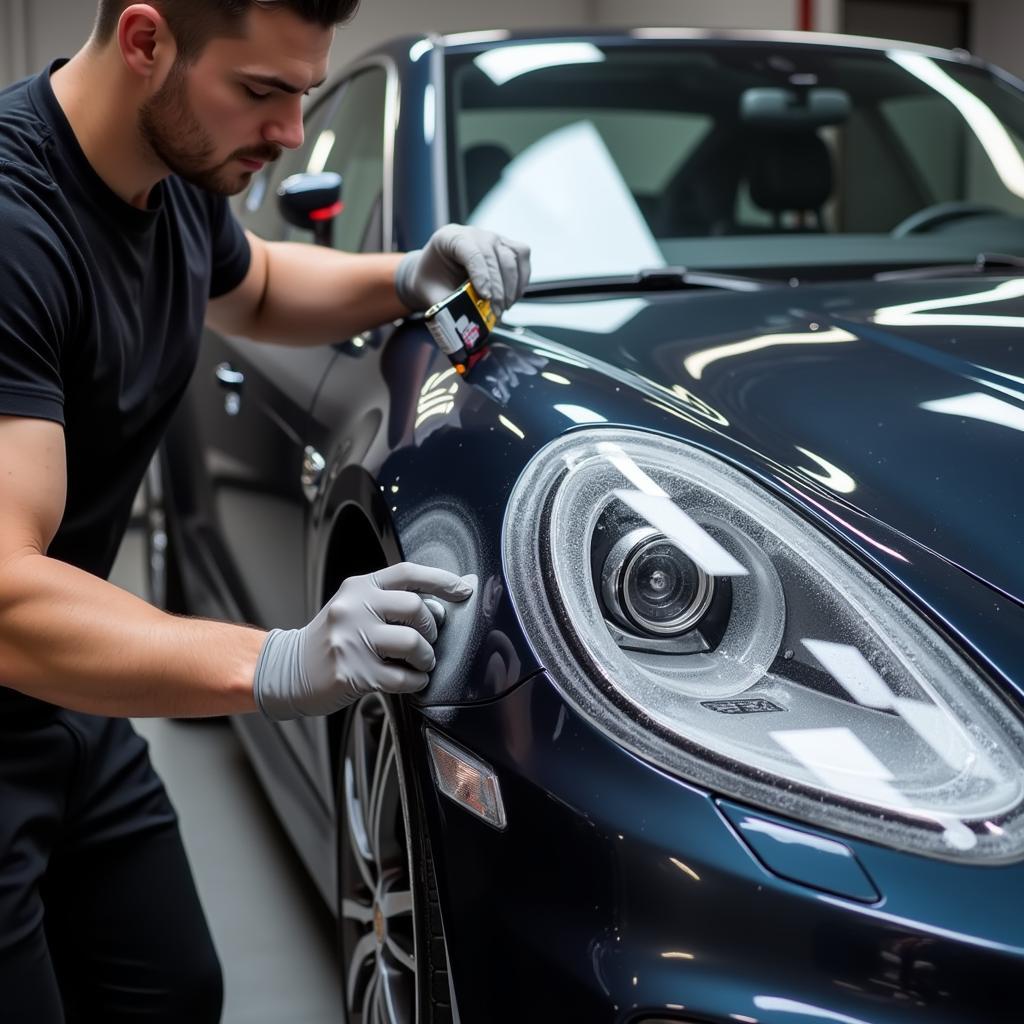Car polishing and detailing are often used interchangeably, but they refer to different aspects of car care. While both aim to enhance your vehicle’s appearance, understanding the difference is crucial for choosing the right service for your needs. This comprehensive guide will delve deep into the world of car polishing and detailing, providing you with expert knowledge to make informed decisions about your car’s aesthetic maintenance.
What is Car Detailing?
Car detailing is a thorough and meticulous cleaning and reconditioning of a vehicle, both inside and out, going beyond a regular car wash. It involves a multi-step process that uses specialized tools and products to restore the paintwork, interior, and other surfaces to their best possible condition. Detailing not only enhances the car’s aesthetics but also helps preserve its value and protect it from the elements.
The Benefits of Regular Car Detailing
Regular car detailing offers several benefits:
- Enhanced Appearance: A detailed car turns heads with its gleaming paintwork, spotless interior, and pristine condition.
- Increased Resale Value: A well-maintained car with a detailed history commands a higher resale value.
- Protection from the Elements: Detailing involves protective measures like waxing and sealant application, safeguarding the paint from UV rays, contaminants, and minor scratches.
- Improved Hygiene: A thoroughly detailed interior eliminates dust, allergens, and unpleasant odors, creating a healthier and more enjoyable driving experience.
Car Polishing Explained: Restoring Paint Perfection
Car polishing is a crucial aspect of car detailing that focuses specifically on the paintwork. It involves using a specialized machine and abrasive polish to remove imperfections like swirl marks, light scratches, and oxidation, resulting in a smooth and reflective finish.
Types of Car Polishes
Different types of car polishes cater to specific needs:
- Compound: The most abrasive type, used to remove deep scratches and severe paint defects.
- Polish: Moderately abrasive, designed to eliminate swirl marks, fine scratches, and oxidation.
- Glaze: A non-abrasive polish that enhances gloss and shine, adding a layer of depth to the paint.
Choosing the Right Car Polish
The choice of car polish depends on the severity of the paint imperfections and the desired outcome. Consulting with a professional detailer is advisable to determine the most suitable polish for your car’s paint condition.
Car Detailing Services: A Comprehensive Breakdown
Car detailing encompasses a wide range of services, each targeting specific areas of the vehicle:
- Exterior Detailing:
- Washing and drying using the two-bucket method to minimize swirl marks.
- Clay bar treatment to remove embedded contaminants from the paint.
- Polishing to eliminate imperfections and enhance gloss.
- Waxing or sealant application for protection and shine.
- Headlight restoration for improved visibility and aesthetics.
- Trim and tire dressing for a complete and polished look.
- Interior Detailing:
- Vacuuming and cleaning of all interior surfaces, including carpets, seats, and dashboard.
- Leather cleaning and conditioning to restore suppleness and prevent cracking.
- Stain removal from carpets, upholstery, and other surfaces.
- Glass cleaning for streak-free clarity.
- Odor removal to eliminate unpleasant smells and create a fresh ambiance.
DIY Car Detailing vs. Professional Detailing
While DIY car detailing is an option for car enthusiasts, professional detailing offers several advantages:
- Expertise and Experience: Professional detailers possess the knowledge, skills, and experience to deliver exceptional results.
- Specialized Tools and Products: They have access to professional-grade tools and products that are more effective and efficient than those available to consumers.
- Time-Saving: Detailing is a time-consuming process, and professionals can complete it efficiently, freeing up your time for other activities.
 Professional car detailer applying a ceramic coating
Professional car detailer applying a ceramic coating
Conclusion
Car polishing and detailing are essential aspects of car care that go beyond mere aesthetics. They enhance the appearance, preserve the value, and protect your investment. Whether you choose DIY or professional detailing, understanding the intricacies of each process empowers you to make informed decisions for a showroom-worthy shine that lasts.
FAQs
1. How often should I detail my car?
It is recommended to detail your car every 3-6 months, depending on your driving habits, environmental conditions, and personal preferences.
2. What is the difference between car wax and sealant?
Car wax is a natural product that provides a deep shine and short-term protection, while sealant is synthetic and offers longer-lasting protection with a slightly less glossy finish.
3. Can I polish my car at home?
While DIY car polishing is possible, it requires proper knowledge, tools, and products. If unsure, it is always advisable to seek professional help.
4. How much does professional car detailing cost?
The cost of professional car detailing varies depending on the size of the vehicle, the condition of the paint, and the services included.
5. How can I maintain the results of car detailing?
Regular washing using the two-bucket method, avoiding harsh chemicals, and parking in shaded areas can help maintain the results of car detailing.
Need expert assistance with your car’s detailing needs? Contact us on WhatsApp: +1(641)206-8880 or email us at [email protected]. Our team of dedicated professionals is available 24/7 to provide tailored solutions and exceptional service.

Leave a Reply